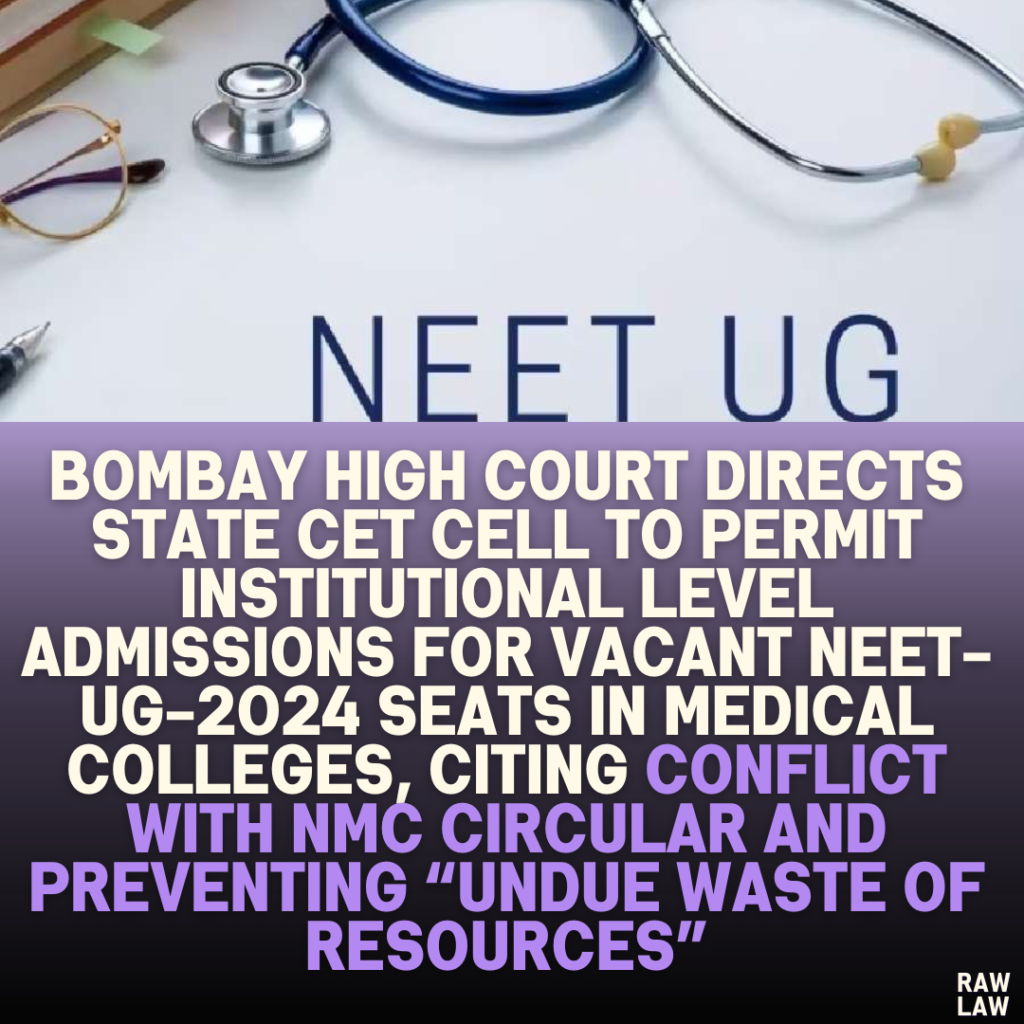Court’s Decision:
The Bombay High Court ordered that seats remaining vacant after all CAP (Centralized Admission Process) rounds in NEET-UG-2024 should be filled through an Institutional Level Round. The Court clarified that the State Legislature has the authority to regulate admissions and directed the concerned authorities to comply with Rule 16 of the Maharashtra Unaided Private Professional Educational Institutions (Regulation of Admission to the Full Time Professional Undergraduate Medical and Dental Courses) Rules, 2016 (Rules of 2016). The matter will be reviewed again on 29/10/2024 to assess compliance.
Facts:
The petition challenged Clause 11.1.9 of the Admission Brochure issued by the State CET Cell, which restricts institutions from filling vacant seats through Institutional Level Rounds. This restriction was implemented based on a circular issued by the National Medical Commission (NMC) on 24/07/2023, which bars institutional-level admissions for vacant seats after all CAP rounds. The petitioners argued that this clause contradicted Rule 16 of the Rules of 2016, which allows institutions to fill vacant seats post-CAP rounds with the prior approval of the Competent Authority.
Issues:
- Whether the State CET Cell can prohibit filling of vacant seats through Institutional Level Rounds post-CAP, as stipulated by the NMC circular.
- Whether the NMC has the legal authority to impose restrictions on institutional admissions after CAP rounds.
Petitioner’s Arguments:
The petitioners argued that Rule 16 of the Rules of 2016 grants institutions the right to fill vacant seats after CAP rounds with prior approval. They contended that the NMC lacks statutory authority to regulate admissions at this level, highlighting that under the Constitution, admissions fall under Entry 25 of the Concurrent List, allowing State regulation in the matter. They cited the Supreme Court’s ruling in Modern Dental College and Research Centre & Others vs. State of Madhya Pradesh to support their claim that the State holds legislative power in educational admissions. The petitioners requested interim relief to allow institutions to fill vacant seats through Institutional Level Rounds based on merit.
Respondent’s Arguments:
The NMC argued that the circular dated 24/07/2023 explicitly prohibits filling vacant seats via Institutional Level Rounds. They cited an affidavit affirming that the NMC’s circular remains binding. The respondents also referenced the Supreme Court’s previous interim order, noting that it was issued in favor of students and not institutions, and emphasized that the prior interim relief does not apply to institutional admissions in this context.
Analysis of the Law:
The Court analyzed Rule 16 of the Rules of 2016, which permits filling vacant seats post-CAP rounds through Institutional Level Rounds, and weighed it against the NMC circular. The Court referenced Entry 25 in the Concurrent List, affirming that the State Legislature possesses regulatory authority in education, including medical admissions. The Court noted that the NMC’s circular, being an executive instruction, cannot override the Rules of 2016 unless there is an amendment to the National Medical Commission Act, 2019.
Precedent Analysis:
The Court reviewed the precedent set in Modern Dental College and Research Centre & Others vs. State of Madhya Pradesh, wherein the Supreme Court held that States have legislative authority in educational matters, specifically in admissions, as per Entry 25 of the Concurrent List. The Court also noted its prior judgment in Saniya Fatima Rahman vs. National Medical Commission, where a similar CET restriction had been upheld, though the NMC circular itself was not directly contested.
Court’s Reasoning:
The Court reasoned that the State CET Cell’s restriction conflicted with Rule 16 of the Rules of 2016, which explicitly allows for Institutional Level Rounds for vacant seats. The NMC circular, being an executive instruction, cannot supersede State legislative rules unless explicitly sanctioned by an amendment. The Court highlighted that allowing vacant seats to go unfilled would result in an undue waste of resources and potential loss to deserving students.
Conclusion:
The Court directed the State CET Cell and other relevant authorities to facilitate filling of vacant seats through Institutional Level Rounds as per Rule 16, notwithstanding the NMC circular. The case will be reviewed on 29/10/2024 to verify compliance with these directives.
Implications:
This ruling reinforces the autonomy of State regulations in the educational sector, especially regarding admission processes, against federal executive instructions that lack legislative backing. It sets a precedent affirming that executive instructions cannot contradict statutory rules unless supported by legislative amendments.
